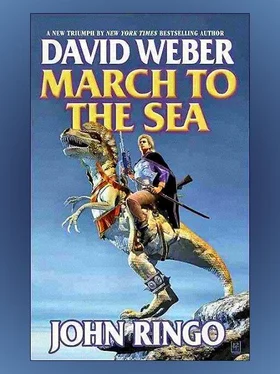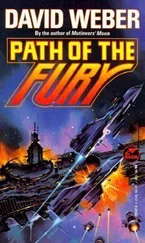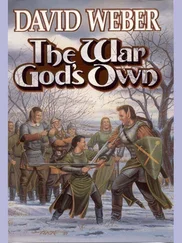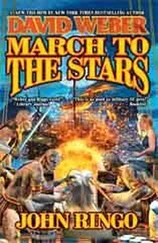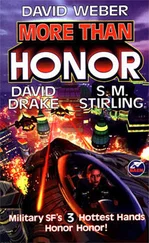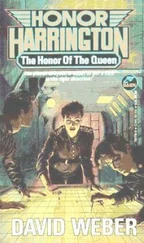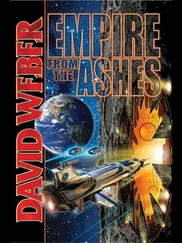David Weber - March to the Sea - Empire of Man Book II
Здесь есть возможность читать онлайн «David Weber - March to the Sea - Empire of Man Book II» весь текст электронной книги совершенно бесплатно (целиком полную версию без сокращений). В некоторых случаях можно слушать аудио, скачать через торрент в формате fb2 и присутствует краткое содержание. Жанр: Фантастика и фэнтези, на английском языке. Описание произведения, (предисловие) а так же отзывы посетителей доступны на портале библиотеки ЛибКат.
- Название:March to the Sea - Empire of Man Book II
- Автор:
- Жанр:
- Год:неизвестен
- ISBN:нет данных
- Рейтинг книги:5 / 5. Голосов: 1
-
Избранное:Добавить в избранное
- Отзывы:
-
Ваша оценка:
- 100
- 1
- 2
- 3
- 4
- 5
March to the Sea - Empire of Man Book II: краткое содержание, описание и аннотация
Предлагаем к чтению аннотацию, описание, краткое содержание или предисловие (зависит от того, что написал сам автор книги «March to the Sea - Empire of Man Book II»). Если вы не нашли необходимую информацию о книге — напишите в комментариях, мы постараемся отыскать её.
March to the Sea - Empire of Man Book II — читать онлайн бесплатно полную книгу (весь текст) целиком
Ниже представлен текст книги, разбитый по страницам. Система сохранения места последней прочитанной страницы, позволяет с удобством читать онлайн бесплатно книгу «March to the Sea - Empire of Man Book II», без необходимости каждый раз заново искать на чём Вы остановились. Поставьте закладку, и сможете в любой момент перейти на страницу, на которой закончили чтение.
Интервал:
Закладка:
"As soon as we get somewhere that has a decent industry, though," the captain went on after a moment, "we're damned well going to see about having some breech-loading percussion rifles made."
"Is that going to be possible?" Roger asked. "I mean, there are a lot of steps between a matchlock arquebus and a breechloader. Spring steel comes to mind."
"Like the spring steel in Rastar's wheel locks?" Pahner asked, smiling faintly. "And have you looked at their pumps?" the Marine went on as the prince's expression turned suddenly thoughtful.
"Not in any depth," Roger admitted. "They have quite a few of them, and they seem pretty damned efficient. I noticed that much."
"Well, I have been noticing them, Your Highness-particularly since Eleanora commented on them back at Voitan. I even took one apart when you were running around in Ran Tai. These people have impeller pumps, and the ones in Deb Tar's mines were pneumatically driven."
"You mentioned that before," Roger agreed. "But what does it mean?"
"An impeller pump requires tight tolerances, Your Highness," O'Casey replied before Pahner could. "You have to be able to lathe, which they do with foot-pedal lathes. It also requires spring material-spring steel in most cases, here on Marduk, although that corrodes faster than the alloys we would use in the Empire. However, every basic technology you need for advanced black powder weapons is found in their pump industry. For that matter, as the captain just suggested, anyone who can build wheel locks can build more advanced lock mechanisms. What we call a 'flintlock' is actually a much less complicated device than a wheel lock. In fact, its advantage, and the thing that made it so important when it was introduced on Earth, was that its simplicity made it cheap enough that armies could afford to convert their infantry to it from the even simpler matchlock. Before that, only cavalry units carried wheel locks for exactly the same reason that Rastar and his troopers do-a matchlock is impractical for a mounted man to manage, and cavalry was considered important and prestigious enough to justify the purchase of specialized and expensive weapons for it."
"So we need to go where t'ey make tee pumps, Sir?" Poertena asked.
"That or one of the armories where the gunsmiths make wheel locks," Pahner agreed, then grinned and nodded at O'Casey. "On the other hand, the gunsmiths seem to guard their 'secrets' pretty zealously ... and they make the pumps everywhere. They have to, with their climate. And I'd rather go somewhere where they have some genuine large-scale manufacturing industry. From what Rastar says, the local gunsmiths are both extremely expensive and pretty damned slow. The ones who make wheel locks spend a lot of time and effort on things like inlay work and decoration-just take a look at Rastar's toys! What we need is someone used to the practical requirements of mass production, or as close to it as anyone on this planet is going to come. When we find him, we'll give him a design for a rifle for the troops and have it produced in quantity. For Rastar's people, too."
"And let me guess," Roger said with a grimace. "That someone wouldn't happen to live in this K'Vaern's Cove, would he?"
"From what I've heard, he probably does, Your Highness," O'Casey said. "Diaspra is a theocracy, and for all that it's also a trading city, it seems fairly typical of the 'mañana attitude' we've seen everywhere else but New Voitan. That's why the Diasprans aren't going to be able to supply us with what we need. But to hear them tell it, this K'Vaern's Cove is the secular center of their known universe. I seem to be picking up a lot of respect for the K'Vaernians, even from the large number of people-mostly clerics-who obviously don't like them. But the Diasprans clearly regard them as not simply heathens, but very peculiar heathens, with all sorts of outrageous notions, including some sort of obsession with more efficient ways to do things which is absolute anathema to something as inherently conservative as a theocratic priest-king's government. So, yes, the logical place to look for the sort of person the captain wants would have to be K'Vaern's Cove."
"Which means he's also right in the middle of this invasion," Roger pointed out. "How are we going to get there to talk to him?"
"Well, first we build us a little army here, then we head upcountry again," Pahner said. "Quickly." He grunted a laugh.
"You got anyt'ing more for me, Sir?" Poertena asked.
"No, Sarge. Thanks for your time," the prince said.
"It's corporal, Your Highness," the Pinopan reminded him. "But t'anks."
"Not any more," Roger said. "I think between the Captain and me, we probably have the juice to get a promotion approved."
"T'ank you, Sir," the armorer said, getting to his feet. "T'anks. I'm gonna turn in."
"Take off, Poertena," Pahner replied.
"Good night, Sirs," the little sergeant said, and headed out the door.
"That was well done, Roger," the Marine CO said when the door had closed.
"He's done a good job," the prince pointed out. "He's been working every night on getting our gear back in shape, and he and Kostas between them have been keeping track of all our supplies, as well. And now this job, without complaint. Well," he corrected himself with a smile, "not any serious complaints."
"Agreed," the captain said, then leaned back and scratched the tip of his nose thoughtfully.
"Getting back to the subject at hand," he went on after a moment, "this is a rich city, despite all of the Council's moaning, and this Laborers of God labor force looks top-notch so far. There's over four thousand of them, too." He shook his head. "I don't understand how any city can just set aside twenty percent of its productive male population as a labor force like this, either. Usually, societies like this use farmers in their off time for any required community labor."
"Eleanora?" Roger asked. "Got any suggestions?"
"It's the barleyrice production, of course," the chief of staff said. "Always look to basic production in societies like this, Roger."
"But there wasn't this labor surplus on the far side of the mountains," the prince replied. "Marshad had a fairly normal ratio, and so did Q'Nkok. And Ran Tai, for that matter."
"Ah, but Marshad and Q'Nkok didn't have draft animals like the turom. Aside from caravan use, the flar-ta might as well not exist as beasts of burden, but that's all they have on the far side of the Tarstens. And Ran Tai-as Poertena pointed out to us at the time-effectively imports all of its barleyrice," O'Casey reminded him with a smile. "I'd say that this place would probably be the center of a Mardukan Renaissance if it weren't locked up tight by the local theocracy."
She glanced at her notes and shook her head.
"The agriculture in this area is phenomenal. The turom gives them a remarkable advantage over Q'Nkok and Marshad, and what with the continuously mild weather, an efficient distribution system for nitrates, and excellent crop rotation, they have five crops of barleyrice every year. Five. And nearly as many crops of nearchicks and taters, not to mention three of apsimons. Each individual farmer is tremendously productive, which is why all those extra laborers are employed by the temple-they'd be out of work otherwise."
"But that condition has to have existed for some time," Roger said, shaking his head. "Shouldn't they have been pulled into other production areas by now? That's the normal reaction to technological improvement; one group is left performing the original function more efficiently, and within a generation the rest of the labor force is switched to other markets, usually new ones that become possible because of the freed labor."
"True." Eleanora smiled. "In fact, I'm delighted to see that you remember my lectures so well. In Diaspra's case, however, the society clearly reacted by taxing the farmers still on the land to establish a ... well, call it a welfare system, and putting the out-of-work ones to work on temple projects. I suspect that if we had a time machine, we'd find that that reaction marked the beginning of the growth of the temple's secular power. And it was probably considered a 'temporary measure,' too."
Читать дальшеИнтервал:
Закладка:
Похожие книги на «March to the Sea - Empire of Man Book II»
Представляем Вашему вниманию похожие книги на «March to the Sea - Empire of Man Book II» списком для выбора. Мы отобрали схожую по названию и смыслу литературу в надежде предоставить читателям больше вариантов отыскать новые, интересные, ещё непрочитанные произведения.
Обсуждение, отзывы о книге «March to the Sea - Empire of Man Book II» и просто собственные мнения читателей. Оставьте ваши комментарии, напишите, что Вы думаете о произведении, его смысле или главных героях. Укажите что конкретно понравилось, а что нет, и почему Вы так считаете.
